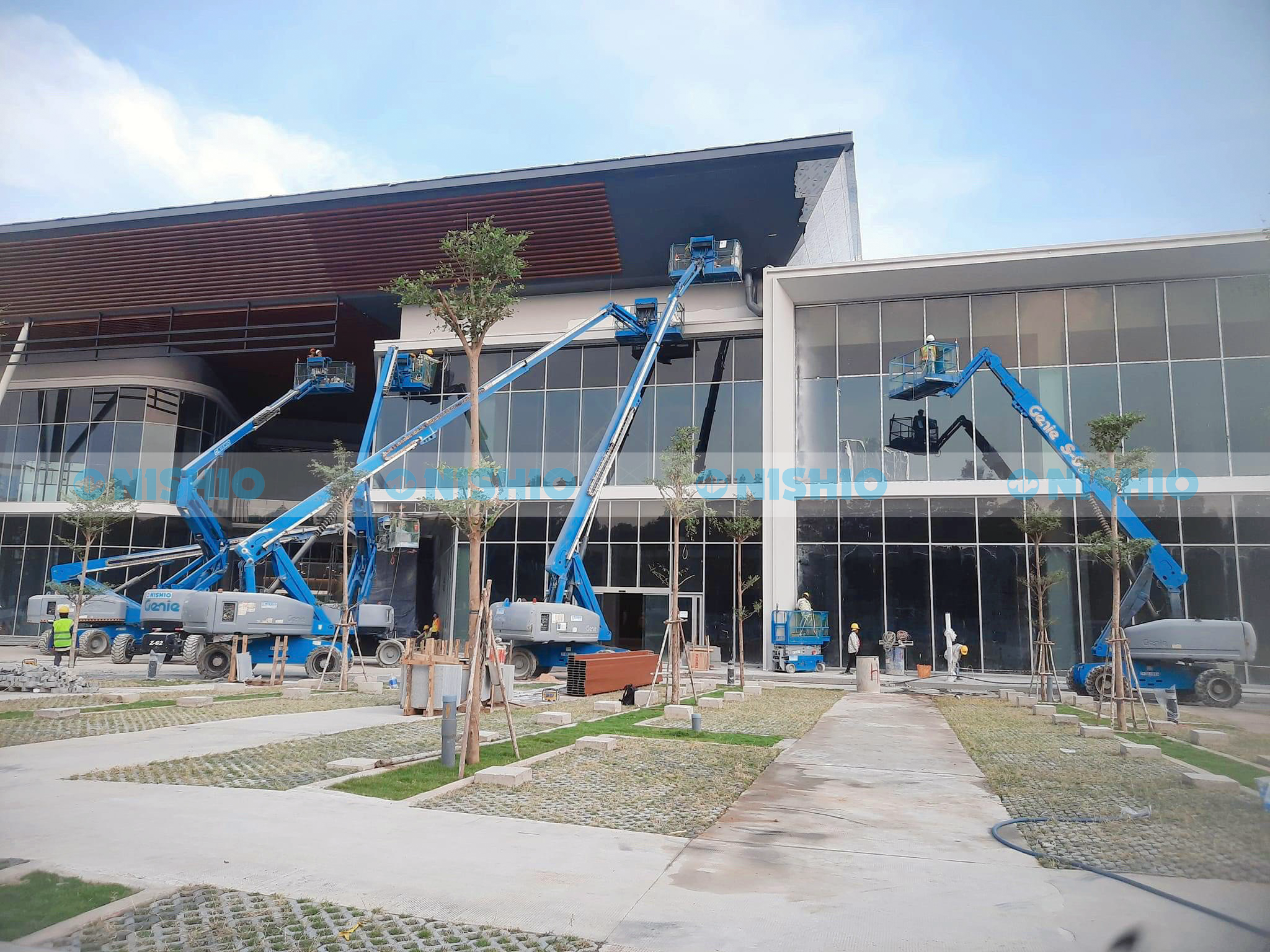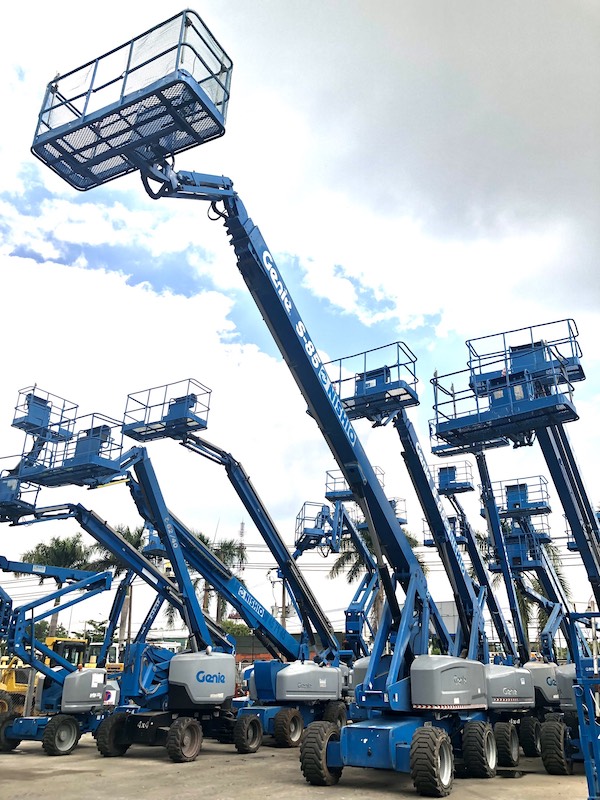- 2023/08/02 Product Information
- AWP equipment (Scissor lift and Boom lift…) for rent in Vietnam
- Below are some benefits that we can list to you: Saving cost and time: This is best advantage that equipment rental service can bring to your business. If you choose purchase brand new machine, you must to pay a big initial budget and spend a long time for preparing the complicate documents by yourself. Flexible and diverse: It’s easy to understand. Sometimes you need to use more than one unit of equipment. Therefore, your company can not buy a new one immediately and do not have enough budget to do that. At that time, of course, you should find out a rental machine supplier. Safety and high-quality machine: If you purchase a machine, you may choose the used one or old models to save money. That kind of machine can have some troubles and that leads to accidents in operating. Meanwhile, you can choose a very new machine from supplier. For example, in NISHIO, we import new machine in every year. (Refer this news: NISHIO is continuously supplying more Genie XC Boom Lifts to the Vietnam market) Increase work efficiency: Whenever the machine get problems, you do not need to find the repairing machine service which will charge a quite expensive fee (exclude the spare parts replacement fee). All you need to do is calling supplier. So, now you can clearly see how equipment rental service can support your business! Renting equipment in day is very common. However, supplier also need time to prepare document and check equipment condition before deliver machine to your side. Therefore, it’s better to send your orders in the previous days. When start to research about Scissor Lift and Boom Lift, you may consider which type is more suitable with your needs. Both of Engine (Diesel) and Electric (Battery) have their own pros and cons Diesel Engine: using diesel to run an engine system inside the machine. This type is stronger than Electric AWP, so it normally is used outside for construction works. However, because using Diesel causes heavy air pollution and big noises, Diesel AWP can not be used inside of the factories and buildings. Electric AWP uses a battery power source. It is clean and less noise. Therefore, people usually use it for the maintenance work and inside the factories. This company was established in 1961, from UK. Genie is known as a famous brand in Aerial Equipment manufacturing with many exclusive inventions. Currently, GENIE is one of the most popular brand in Vietnam AWP equipment market. GENIE promises to deliver the Quality your business needs: Durable equipment, expert support, and dependable parts. NISHIO and GENIE have had a business relationship since we established in Vietnam until now. We import a large number of machines from GENIE every year. Refer: The annual AWP technical training of GENIE at NISHIO Skyjack is a Canadian forklift brand founded in 1985. This company provides the high quality lifting equipment such as Boom Lift and Scissor Lift. Below are some standards to chose a good company that provide equipment rental service: Repution: You should look for the ranking of reputable machinery and equipment rental companies in the Vietnamese market. Or ask the experienced people. Number of machine: The number of machine/equipment available for rent from the supplier shows their investment level and also to ensure that they always have a machine replacement plan. Reasonable price: The rental price must be suitable with the machine quality. Machine quality: You should check it carefully to avoid the unexpected accidents. NISHIO RENT ALL VIETNAM CO.,LTD. is the leading company in Equipment Rental Service. No.12 in the ranking list of 100 biggest companies that do machinery rental service in the world. More than 60 years experience in global and more than 10 years in Vietnam market. Our machine number and machine lineup for rent is the biggest and the most diverse in Vietnam. We provide AWP equipment daily to yearly rental nationwide. We are the business partner of the famous brands: Genie, Skyjack, JLG… We are trusted and chosen by reputation contractors to be a supplier of AWP equipment for most key projects in Vietnam. (Renewable energy projects, Thermal power, Gas, Commercial buildings, Infrastructure & Civil,…) Our rental price includes the maintenance service by a team of high-skilled mechanic. Equipment rental price must be one of the thing that makes you feel concern. The quotations of each companies can be different, it depends on many factors. However, we express that Price is usually based on machine quality. It is perfect if you can find out a good service together with a good price. But if the price is much cheaper than market price, it may hide some unexpected troubles. GS1930 (7.79m max. working height) GS1932 (7.85m max. working height) GS2032 (7.92m max. working height) GS2046 (8.10m max. working height) GS2632 (9.80m max. working height) GS2646 (9.80m max. working height) GS3246 (11.75m max. working height) GS4047 (13.94m max. working height) GS1932m E-Drive (7.55m max. working height) GS1930 E-Drive (7.85m max. working height) GS2646 E-Drive (9.96m max. working height) GS3246 E-Drive (11.78m max. working height) GS4046 E-Drive (13.94m max. working height) GS4655 E-Drive (15.95m max. working height) GS5390 (18.15m max. working height) 1939ES (7.72m max. working height) SJ3219 (7.79m max. working height) SJ4732 (11.65m max. working height) Z33/18DC (12m max. working height) Z45/25DC (15.87m max. working height) Z60/37 DC (20.16m max. working height) Z34/22IC (12.54m max. working height) Z45/25 (15.86m max. working height) Z60/34 (20.39m max. working height) Z62/40 (20.87m max. working height) Z80/60 (25.77m max. working height) Z80/60 (25.77m max. working height) Z135/70 (42.15m max. working height) Z60/37 FE (20.16m max. working height) S65 (21.81m max. working height) S80 (26.38m max. working height) S85 (27.90m max. working height) S-85 XC (27.91m max. working height) S100 (32.48m max. working height) S125 (40.15m max. working height) SX150 (48.33m max. working height) S-65 TraX (21.81 max. working height) 860SJ (28.21m max. working height) AWP40S (14.3m max. working height) SJ12 (5.65m max. working height) QU13 (13.7m max. working height) QU14 (14.3m max. working height) STAR10 (10 m max. ...
- 2022/03/11 Product Information
- Things you need to know when using a Boom Lift on the slope
- Boom lifts can go much higher than scissor lifts — up to 39.6m (130 feet) or more. They offer greater flexibility than scissor lifts, since the bucket rests on a hydraulic arm and can move in all directions. Meanwhile, boom lifts have smaller platforms than scissor lifts to keep the safe because it goes up higher than scissor lift. They are also ideal for jobs where the worksite is small or hard to access. Like scissor lifts, boom lifts aren’t recommended to use on a hill or incline. The center of gravity is higher with this machine than with many others, which increases the risk for a tip-over. However, it is possible to work on an incline as long as you don’t exceed the maximum slope with a safe working load for the boom lift. Safely driving a boom lift on a slope starts with knowing the lift’s maximum slope rating is very important. A digital inclinometer can be used to measure the exact degree of a slope. If you don’t have one, place the board at least 3 feet long on a slope. Then, place a carpenter’s level on the board and raise the lower end of the board level until it is horizontal. Once you do that, complete these steps: Measure the distance to the ground. Divide the distance by the length of the board. Multiply the result by 100. This simple formula provides the percent of the slant. If the number exceeds the max slope rating, do not drive the lift on the slope. Instead, winch or hoist the lift across the sloped area. Keep in mind that max slope ratings can change due to ground conditions and weather. For example, mud or loose gravel can reduce traction and extend stopping distances. Driving speeds need to be reduced when crossing sloped or rough terrain as well. Proceed with caution why you drive a boom lift on a slope near drop-offs or cliffs. There are many things that you can do to safely use a boom lift on a slope, such as: ✓ Use a pre-operation checklist to inspect a lift before you use it. ✓ Make sure a lift’s tires are inflated to the proper pressure, as low or high pressure can impact a lift’s stability. ✓ Check the surrounding area for un-compacted fill, ditches, and holes and address these issues before you begin work. ✓ Only use a lift designed to climb slopes. ✓ Check the weather report before you start work; if inclement weather is on the horizon, you need to plan accordingly. ✓ Make sure operators and ground workers are trained and certified to use a boom lift. Construction Equipment A boom lift should never be used in winds that exceed 45km/hour (28 mph). When in doubt about whether to operate a boom lift in high wind conditions, use your best judgement, and always err on the side of caution. Furthermore, you should always check a worksite for overhead hazards, such as overhangs or high-voltage power lines. As a general rule of thumb, stay at least 50 feet away from electrical wires on steel towers and 30 feet away from wires on wooden or concrete poles. Last but not least, remember that using an Articulating Boom Lift is safer than using a Telescopic Boom Lift on the slope. A boom lift safety training course can make a world of difference. By receiving boom lift safety training, you can learn how to properly operate a boom lift on slopes, lower your risk of boom lift accidents, and more. NISHIO also offers training lessons for safe operation to your operators. If you have any questions, do not hesitate to contact us!




